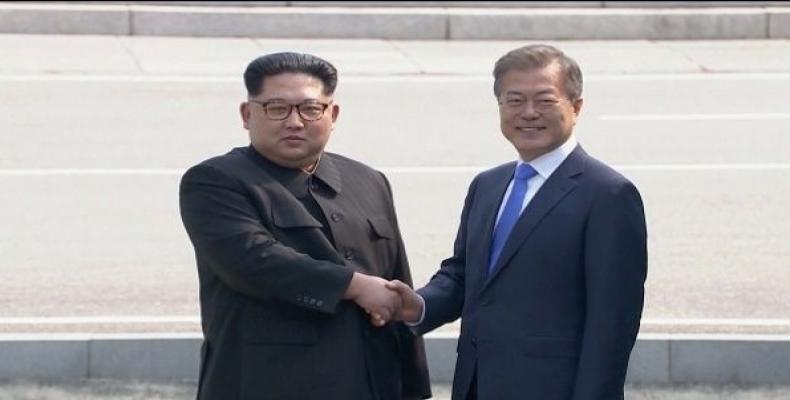Pyongyang, April 27 (RHC)-- North Korean leader Kim Jong Un and the South's President Moon Jae-in have signed a joint declaration agreeing to work for the "complete denuclearization of the Korean peninsula" following their historic summit.
During their first summit in more than a decade on Friday, the two leaders further stated that they would seek an agreement to establish "permanent" and "solid" peace on the Korean peninsula, according to local press reports.
The landmark declaration also includes pledges to pursue military arms reduction, cease "hostile acts," turn their fortified border into a "peace zone," and seek multilateral talks with other nations, such as the United States.
Moreover, Moon will visit Pyongyang later this year, according to the joint statement, further noting that the trip will take place next autumn, 11 years after his late political mentor Roh Moo-hyun went to the North's capital for the second inter-Korean summit.
South Korean media also underlined that the two leaders embraced warmly after signing the declaration in which they further announced that "there will be no more war on the Korean Peninsula."
Amid high anticipation including for denuclearization in their discussions, South Korea’s presidential spokesman Yoon Young-chang stated prior to the development that "the two leaders had a sincere and frank dialogue over the denuclearization and the establishment of permanent peace of the Korean peninsula and development of inter-Korea ties."
Kim and Moon entered the unprecedented talks earlier in the day after shaking hands over the Military Demarcation Line that divides the two neighboring and rival nations in a symbolic gesture. Kim is the first North Korean leader to set foot on South’s soil since the Korean War in early 1950’s.
Korean leaders sign joint declaration pledging denuclearization

Articles en relation
Commentaires
Laissez un commentaire
Tous les champs sont requisPlus de visites
- Les États-Unis annoncent des restrictions en matière de visas liées à la coopération médicale internationale de Cuba
- Le chanteur populaire Paulo F.G. meurt dans un accident de voiture à La Havane
- Cuba : les migrants à Guantanamo sont une provocation et un affront à la souveraineté (+Photos)
- Le gouvernement cubain condamne les intentions des États-Unis concernant la base navale de Guantanamo
- Washington révoque la licence accordée à Chevron, "une décision nuisible et d'inexplicable"

